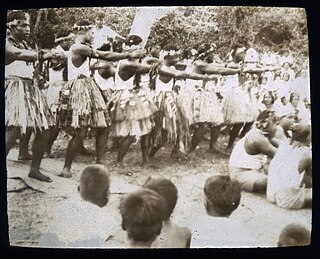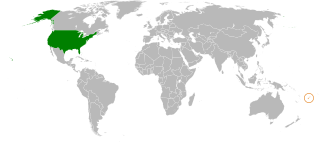
Mahendra Pal Chaudhry is a Fijian politician and the leader of the Fiji Labour Party. Following a historic election in which he defeated the long-time former leader, Sitiveni Rabuka, the former trade union leader became Fiji's first Indo-Fijian Prime Minister on 19 May 1999, but exactly one year later, on 19 May 2000 he and most of his Cabinet were taken hostage in the Fiji coup of 2000 by coup leader George Speight. Unable to exercise his duties, he and his ministers were sacked by President Ratu Sir Kamisese Mara on 27 May; Mara intended to assume emergency powers himself but was himself deposed by the military leader, Commodore Frank Bainimarama.

Laisenia Qarase was a Fijian politician. He served as the sixth Prime Minister of Fiji from 2000 to 2006. After the military quashed the coup that led to the removal of Mahendra Chaudhry, Qarase joined the Interim Military Government as a financial adviser on 9 June 2000, until his appointment as Prime Minister on 4 July. He won two parliamentary elections, but a military coup removed him from power on 5 December 2006. He was later imprisoned on corruption charges brought by the military-backed regime.

The United Fiji Party was a political party in Fiji. It was founded in 2001 by Prime Minister Laisenia Qarase as a power base; it absorbed most of the Christian Democratic Alliance and other conservative groups, and its endorsement by the Great Council of Chiefs (Bose Levu Vakaturaga) caused it to be widely seen as the successor to the Alliance Party, the former ruling party that had dominated Fijian politics from the 1960s to the 1980s. It drew its support mainly from indigenous Fijiians.

Brigadier-General RatuEpeli Nailatikau, is a Fijian chief who was President of Fiji from 2009 to 2015. He has had a long career in the Military, diplomatic service, and government. From 2001 to 2006 he served as Speaker of the House of Representatives – the lower and more powerful chamber of the Fijian Parliament. He was also the chairman of the Parliamentary Appropriations Committee and of the House Committee. On 8 January 2007, he was appointed the interim Minister for Foreign Affairs and External Trade; he was moved to the post of interim Minister for Provincial Development and Multi-Ethnic Affairs in September 2008. In October 2008, he became Indigenous Affairs Minister "and effectively Great Council of Chiefs chairman". On 17 April 2009, he was appointed Vice-President by the military government.

The prime minister of Fiji is the head of government of the Republic of Fiji. The prime minister is appointed under the terms of the 2013 Constitution. The prime minister is the head of the Cabinet and appoints and dismisses ministers.
Brigadier-General RatuEpeli Ganilau, MC, MSD, was a Fijian military officer and politician. His career previously encompassed such roles as Commander of the Fiji Military Forces and Chairman of the Bose Levu Vakaturaga. On 15 January 2007 he was sworn in as Minister for Fijian Affairs in the interim Cabinet formed in the wake of the 2006 Fijian coup d'état which deposed the Qarase government on 5 December 2006.
RatuTevita Momoedonu was a Fijian politician who served as the fifth Prime Minister of Fiji twice – each time extremely briefly. Both appointments were to get around constitutional technicalities; his first term of office – on 27 May 2000 lasted only a few minutes. His second term – from 14 to 16 March 2001 was for two days. He subsequently served his country as Ambassador of Fiji to Japan. Using his chiefly title of "Taukei Sawaieke", he later led pushed for the Yasana of Ba to secede from the Burebasaga and Kubuna Confederacies to form their own fourth confederacy under the Tui Vuda, Ratu Josefa Iloilo, who died in 2011.

Fijians are a nation and ethnic group native to Fiji, who speak Fijian and English and share a common history and culture.

The Conservative Alliance was a right-wing political party in Fiji, and a member of the ruling coalition government. It was commonly known as the CAMV, a combination of the initials of its English and Fijian names. At its annual general meeting on 17 February 2006, the party voted to dissolve itself and merge with its coalition partner, the Soqosoqo Duavata ni Lewenivanua (SDL). The President of the party at the time of its dissolution was Ratu Tanoa Cakobau, a Bauan chief, while Ratu Josefa Dimuri served as General Secretary. For legal reasons, Parliamentary members of the disbanded party maintained a separate caucus in the House of Representatives, under the leadership of Ratu Naiqama Lalabalavu, until the end of the parliamentary term, on 27 March 2006.
Since attaining independence from the United Kingdom on 10 October 1970, Fijian history has been marked by exponential economic growth up to 1987, followed by relative stagnation, caused to a large extent by political instability following two military coups in 1987 and a civilian putsch in 2000. This was followed by another military coup in 2006. Rivalry between indigenous Fijians and Indo-Fijians, rather than ideological differences, have been the most visible cleavage of Fijian politics. Later in 2020, Fiji was hit by the global COVID-19 pandemic, which affected the economy and the daily lives of the people.

Poseci Waqalevu Bune was a Fijian civil servant, diplomat, politician and Cabinet Minister. He served as chair of the Public Service Commissioner, secretary to the Prime Minister, and as Fiji's permanent representative to the United Nations, as well as a Cabinet Minister in the governments of Mahendra Chaudhry and Laisenia Qarase, and in the military regime of Frank Bainimarama. Bune died of prostate cancer on 22 November 2023, at the age of 77.

Rose Lavenia Bernadette Rounds Ganilau, born July 5, 1951, as Lavenia Bernadette Rounds, is a Fijian writer, broadcaster, and politician, who served as Minister for Labour, Minister for Tourism, Industrial Relations, Productivity and Environment in the interim Cabinet of Commodore Frank Bainimarama, having been appointed on 9 January 2007. In previous political roles, she served in 2000 and 2001 in the Interim Government of Prime Minister Laisenia Qarase as Assistant Minister for Social Welfare, and from June to December 2006, she was Deputy Leader of the Opposition and Chairperson of the Public Accounts Committee of the House of Representatives, until the military coup of 5 December.

General elections were held in Fiji between 6 and 13 May 2006.

Fiji–India relations are the foreign relations between Fiji and India. Fiji has a high commission in New Delhi, whilst India has a high commission in Suva.
Mitieli Bulanauca is a Fijian politician and former Cabinet Minister. He is currently a member of the People's Alliance.

The Fijian coup d'état of December 2006 was a coup d'état in Fiji carried out by Commodore Frank Bainimarama against Prime Minister Laisenia Qarase and President Josefa Iloilo. It was the culmination of a political crisis that had begun the previous year when the Qarase government introduced three bills to the Fijian Parliament. The Qoliqoli, Land Tribunal, and Reconciliation, Tolerance, and Unity Bills dealt with the ongoing ethnic conflicts in Fiji and the aftermath of the 2000 coup, and were considered to be pro-ethnic Fijian. Bainimarama, the Commander of the Republic of Fiji Military Forces (RFMF), presented the government with a list of demands on October 16 that included withdrawing the bills. Attempts at negotiation failed and the military launched a coup on 4 December. Parliament was dissolved, Qarase and his cabinet were dismissed, and some civilian officials were placed under house arrest. After the Great Council of Chiefs refused to appoint a cabinet friendly to the military, Bainimarama reached an understanding with Iloilo and reinstated him as president on 4 January 2007. Iloilo then appointed Bainimarama acting prime minister in charge of the Interim Cabinet.
The People's Charter for Change, Peace and Progress was a proposed legal document which would have complemented the 1997 Constitution of Fiji. It would have established compulsory guidelines for any government policy in Fiji over the coming years. The People's Charter was due to be completed and come into force prior to the scheduled 2014 general election.

The bilateral relations between the Fiji and the United States have improved significantly since Fiji's elections in September 2014, which restored a democratically elected government to Fiji for the first time since 2006. The United States had opposed Fiji's unelected government, which came to power through a military coup in December 2006.

Indo-Fijians, also known as Indian Fijians, are Fijian citizens of South Asian descent, and include people who trace their ancestry to various regions of the Indian subcontinent. Although Indo-Fijians constituted a majority of Fiji's population from 1956 through to the late 1980s, discrimination and the resulting brain drain resulted in them numbering 313,798 (37.6%) out of a total of 827,900 people living in Fiji as of 2007.

RatuJosefa Iloilovatu Uluivuda, was a Fijian politician who served as the 3rd President of Fiji from 2000 until 2009, excluding a brief period from 5 December 2006 to 4 January 2007. He held the traditional title of Tui Vuda, the paramount chief of the Vuda district in Ba Province on Fiji's northwest coast. Like many Fijian people, he rarely used his surname and was known simply as Josefa Iloilo. He announced on 28 July 2009 that he would be leaving office on 30 July. At the age of 88, he was the world's oldest head of state.













